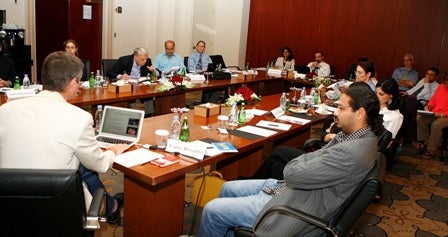Focused Discussions, Race & Society, Regional Studies
Migrant Labor in the Gulf Working Group II

On January 9–10, 2010, CIRS convened the second of three planned working group meetings on “Migrant Labor in the Gulf.” Scholars from Europe, the United States, Asia, and the Gulf region assembled in Doha to discuss particular aspects of migrant labor. Among the participants were CIRS Research Grant recipients: Andrew Gardner of Qatar University, Arland Thornton and Mansoor Moaddel of the University of Michigan, Mary Breeding of Georgetown University, and David Mednicoff of the University of Massachusetts-Amherst. The CIRS initiative and grants program expand the depth and breadth of original scholarly research on migrant labor in the Gulf.
The working group participants hailed from a variety of disciplines including, anthropology, political science, legal studies and public policy, and statistical demography. The scholars analyzed the broad historic, post-colonial, and diasporic origins of migrant labor to the Gulf. They examined issues related to the host and sending countries; questions of citizenship, identity, and gender politics; demography and migratory processes; policy regulations; economics and remittances, and nationalization of local labor markets, among larger issues of long-term social change.
The participants reported on empirical research they had conducted among migrant populations in Kuwait, Qatar, and the UAE, as well as in Nepal, a key country of origin for labor migrants in the Gulf. While there are some common elements of the experience of migrants across the Gulf, the group emphasized the need for case-based research because of striking differences across migrant labor communities. They highlighted differences between domestic and industrial labor; high income and low income workers; physical and linguistic boundaries; the reconstruction of social identities and senses of place; as well as the cultural and social practices of local and migrant communities.
The group rejected characterizations that “exceptionalize” the Gulf, i.e., that assume its labor migrants are unlike those in all other societies. On the contrary, the group believed that the concerns of migrant laborers are chronic to labor systems all over the world.
During the discussions, the participants narrowed down the overall themes of the initiative and outlined the missing areas of scholarship that need to be addressed during the project. Many noted the lack of consensus about terminology in current scholarship on migrant labor. Throughout their discussions, they parsed the socio-political implications of terms like “migrant labor,” “foreign worker,” “guest worker,” and “non-citizens.” Some scholars argued that “temporary labor” in the Gulf does not actually refer to temporal transience as many of these workers have lived and worked in the Gulf for years, and even generations. The notion of transience is therefore better conceived as a matter of ease of turn-over, rather than duration of work assignment.
The two-day meeting also involved assigning specific paper topics to all the discussants. The papers will become the bases for chapters of an edited volume titled Migrant Labour in the Gulf (Columbia University Press/Hurst, 2012). The first working group meeting took place on May 16–17, 2009.
- Read more about this research initiative
Participants and Discussants include:
Rogaia Abusharaf, Georgetown University School of Foreign Service in QatarAttiya Ahmad, Georgetown University School of Foreign Service in QatarZahra Babar, Georgetown University School of Foreign Service in QatarMary Breeding, Georgetown University, Washington, DCJane Bristol-Rhys, Zayed UniversityJohn T. Crist, Georgetown University School of Foreign Service in QatarAndrew Gardner, Qatar UniversityJennifer Heeg, Texas A&M University in QatarMehran Kamrava, Georgetown University School of Foreign Service in QatarPardis Mahdavi, Pomona CollegeDavid Mednicoff, University of Massachusetts–AmherstSuzi Mirgani, Georgetown University School of Foreign Service in QatarMansoor Moaddel, University of Michigan, Ann ArborMahmood Monshipouri, San Francisco State UniversityCaroline Osella, School of Oriental and African Studies, University of LondonFilippo Osella, University of SussexKasim Randeree, Oxford UniversityUday Rosario, Georgetown University School of Foreign Service in QatarRodney Sharkey, Weill Cornell Medical College in QatarHélène Thiollet, Sciences PoArland Thornton, University of Michigan, Ann Arbor
Article by Suzi Mirgani. Suzi is CIRS Publications Coordinator.